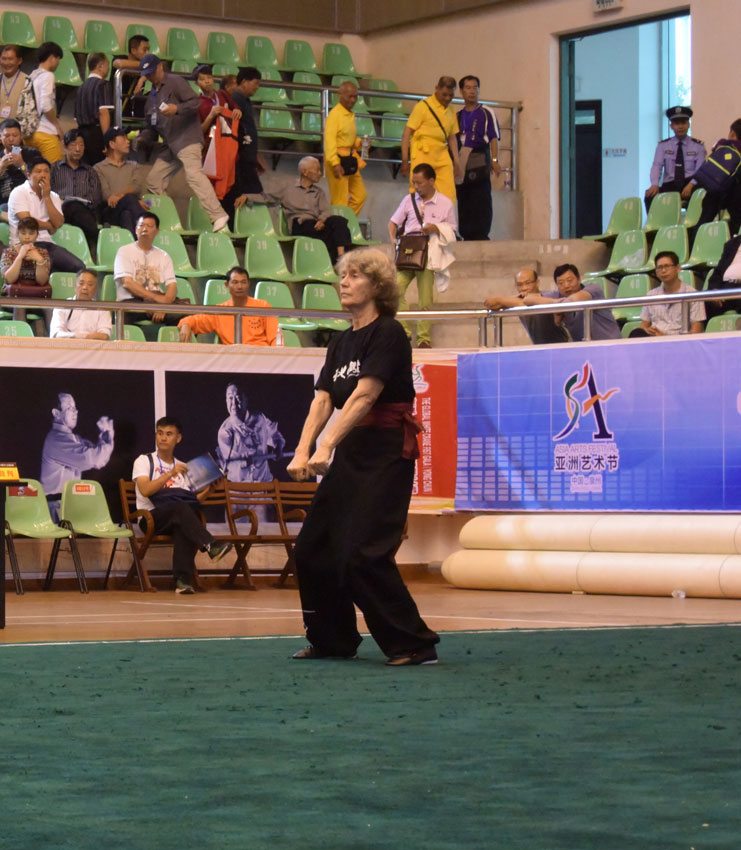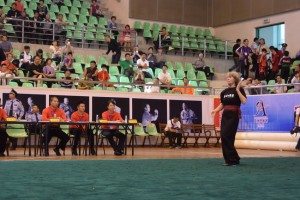“Could you write something about the health benefits of Tai Chi?” the Editor of Calibre Quarterly magazine asked Instructor Richard Wagstaff. “No problem”. And here it is: Fighting Spirit. Yes we all agree that 65-year old Chief Instructor Dennis Ngo looks “impressive” (in the words of the Calibre Editor). Whilst preparing the article, discussions turned to people’s perceptions of Tai Chi as for those who were not “up to” the hard style of Kung Fu. Why don’t I just come out with it and say “mature” or “older” or “middle-aged”? Because, leaving aside considerations of acceptable language and the implied stereotypes, these are labels that don’t provide any useful information. I like the word “grown-ups” – you are a grown-up when you think you are and remain so as long as you wish.
One of our Grown-Up Students, Jill Steen, did not start training with us until she had been a grown-up for quite some time. She is really making up for any lost time (if you call having a successful and interesting life “lost time”). Jill trains several times a week and has travelled with us to China, Egypt, and Crete. During training camps she gets up in the morning and goes on the dawn pre-breakfast runs. Jill has twice competed in China at International Martial Arts competitions (as in the photo above). In China competitors are grouped by age and there is no lack of competition in the older age categories.
Jill takes up her story here – and it all started with a leaflet coming through her front door….
Jill gets a leaflet
“I arrived at my mid-sixties with no formal exercise since school. Having dyspraxia (a learning disability that includes difficulty in carrying out smooth, coordinated movements with consequent clumsiness and problems with balance) and somewhat deformed feet, I tripped and fell regularly. It was serendipity that on the same day I attended a lecture outlining the potential benefits of Tai Chi in preventing falls in the elderly, I returned home to find a leaflet on the mat advertising Fujian White Crane Tai Chi and Kung Fu.
My start of Suang Yang Tai Chi classes was somewhat delayed because only Kung Fu was being taught locally at the time. However after a few months I was attempting to “walk on clouds” and balance my way through the nine-step Bagua. I struggled but could see benefits from early on. As my leg strength increased so did my balance and also my confidence. In crowded areas I began to walk down flights of stairs without having to grasp the rail fearing being knocked askew by passing people.
Looking back now…
Several years on, looking back to see what has improved for me, I compare myself to my contemporaries. I need no medication for blood pressure or heart disease, my joints move as they should without “wear and tear” and I have abundant energy and sleep well. Some of this, of course may be due to good luck or good genes but I think that the FWC soft-style of Tai Chi has provided a complete form of exercise that benefits the body as a whole with minimal risk of injury.
Age is a gradual continuous process of natural change but people do not become old at a specific age. It can defined:
- Chronologically, but this is just a number
- Biologically, with the changes inherent with age affect some people sooner than others. Some may be “old” at 40, others still young decades later.
- Psychologically, wherewith a person’s attitude and their subsequent actions and feelings having a profound effect on how age is perceived.
In soft-style Tai Chi the will or mind commands, strength obeys and energy flows, aspects, if developed, that would be expected to minimize the biological and psychological effects of ageing. I keep training FWC Suang Yang Tai Chi not only because I enjoy it but also because I have no doubt that it greatly benefits my health and well-being regardless of my chronological age.”
Stereotypes are so 18th-Century
The word “stereotype” was first used in 1798 in the printing industry to describe a most useful labour-saving device – a fixed plate that could be printed from repeatedly without having to set the fiddly little type into a form. Now the term has the negative connotations of lumping people into groups on the basis of lazy thinking. Just because the modern stereotype is not as useful as its eighteenth-century equivalent does not prevent if from being damaging. And to counter this we also have the concept of positive stereotypes, which then raises the issue of “role models”. We are now far away from the whole “Tai Chi for Grown-Ups” subject, but I would like to mention a study in The Journal of the American Medical Association which revealed that “positive age stereotypes” improve people’s recovery from a disabling illness.
And neither stereotypes, nor age nor illness held back the participants in the Channel 4 Documentary “Seventy with a Six Pack”.
Positive role models abound:
Picasso said: “It takes a long time to become young.”
Yoda said , “When 900 years old you will reach, look as good you will not.”
Dennis said, “好好训练或者走人”
And if you ever think you are not up to Kung Fu but could only manage Tai Chi, then think again. The emphasis and the training are different, but the martial spirit is the same.
You can read the article as a PDF here: Tai Chi HEALTH
Sharon Ngo – Instructor, Fujian White Crane Kung Fu & Tai Chi


